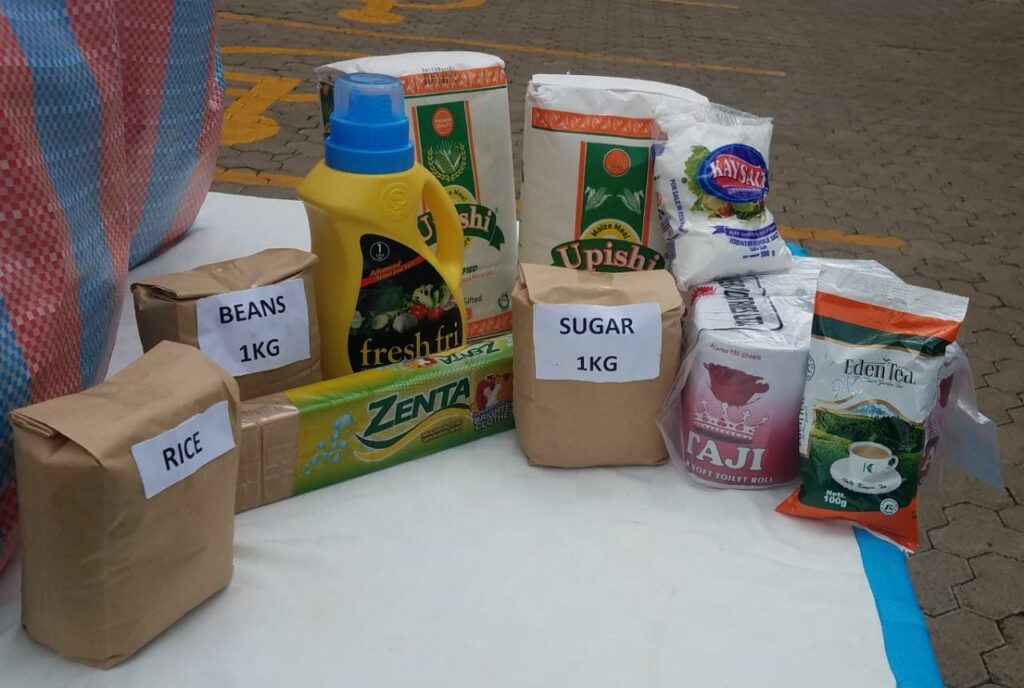Nairobi, Kenya – Since the first case of Covid-19 was reported in Kenya and subsequent containment measures announced by the president to contain the virus, 30-year-old Carditor Zinga’s business was affected. Carditor runs a general shop in the outskirts of Nairobi and says in the 11 years she has been in business, 2020 is proving to be a challenging year. A combination of stay at home advisories and a dusk to dawn curfew has resulted in the reduction of customer visits to her shop. Most of her customers are casual labourers and have lost or seen a reduction in their income and unable to keep their families well fed.
Addressing an Economic Crisis
The COVID-19 pandemic has created an economic crisis for already strained families living in informal settlements and slum communities. The closure of schools and many businesses has left informal labourers with limited opportunities to meet their most basic needs.
In May 2020, Kenya Connection working with local Anglican churches established a COVID-19 relief food plan to support vulnerable and poor families suffering food insecurity in informal settlements and slums in Kenya through a tangible expression of the love of God by providing food baskets.

Local Entrepreneurs Respond to Covid-19
Carditor who is coordinating the COVID-19 relief, has provided a strong Christian witness in spite of the challenges facing her own business. Together with Kenya Connection they have been able to come up with a food basket which contains 2 packets of 2 kg maize flour, 1 kg bar soap, 1 kg rice, 1kg beans, 100 grams of tea bags, 4 pack toilet paper, 1-liter cooking oil, salt and sugar. One basket costs just $10 and can help sustain a family for one week. Carditor has also offered discounted prices on essential goods to her community every first Friday of the month to enable her customers who are on a tight budget to have planned purchases.
Provision of food is a tangible expression of the love of God and was an important aspect of Jesus’ own earthly ministry. The Good News of Jesus Christ is often experienced among the most-poor through the kindness of Christian neighbours and friends. Our COVID-19 relief programs are run in close partnership with local churches and ministries which alongside care for practical needs, proclaim the message of forgiveness, reconciliation, and new life through the death and resurrection of Jesus, the Messiah.

How Food Relief Helps Families
Wesonga is one of the beneficiaries and lives with his single mother and 3 siblings. The pandemic has made it difficult for his mother to make ends meet as she has seen a reduction in her income and the food basket has come in handy. “Before the food basket we were uncertain of where our next meal would come from and this was a burden for my mum. Now, she doesn’t have to worry about food and I am grateful. My family can sleep with a full stomach and we can concentrate our energy on other activities”, says Wesonga who has received the food basket five times.
The food distribution was done on a weekly basis that saw 12 families benefit from the initiative across informal settlements of Kawangware, Kangemi and Uthiru. “This was a huge boost to these families in these tough economic times”, says James Were one of the coordinators of the project. The program has now been extended to staff members of Akiba School as well as vulnerable families in Siaya and Kilifi, Kenya and is now reaching about 100 families.
Another beneficiary, 21-year-old Sharon who lives in Kawangware says “before the food basket, we struggled to get food as work was hard to come by for my parents but the food basket has come in handy for my 2 siblings and parents and we are grateful.”

By God’s grace Kenya Connection aims to respond to the basic needs of the vulnerable poor through Christian witness and discipleship, community health education, economic empowerment, and appropriate provision of emergency relief (during times of crisis).
Kenya Connection has received grants from the Society of Anglican Missionaries and Senders as well as gifts from churches and individual partners to support this initiative. If you would like to contribute, please click here.
Written by Geoffrey Njenga.



